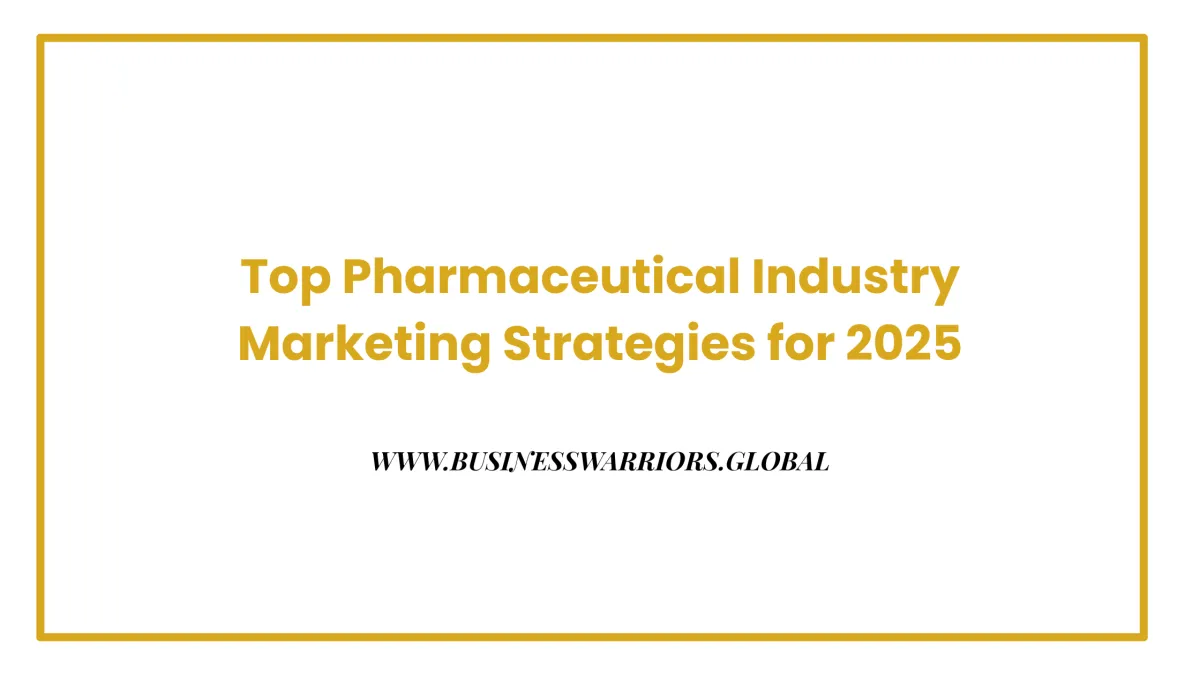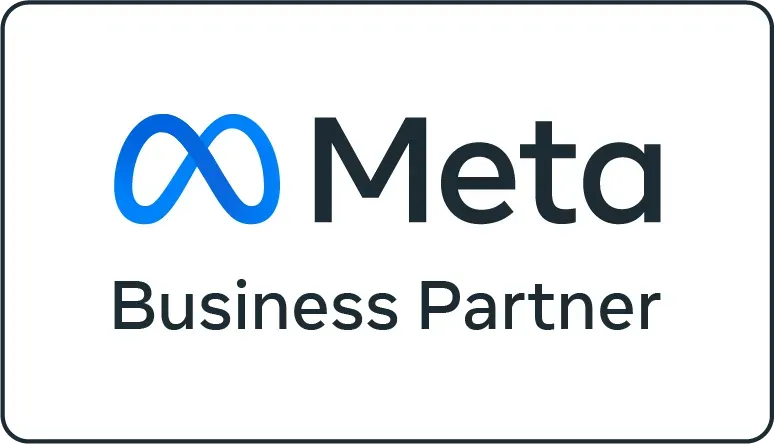
Top Pharmaceutical Industry Marketing Strategies for 2025
Pharmaceutical industry marketing requires specialized strategies to ensure drugs reach the right audiences. This article highlights how to effectively target healthcare professionals, leverage digital marketing, and comply with regulations. By mastering these areas, you can optimize your marketing campaigns and ensure your products stand out in a competitive market.
Key Takeaways
Pharmaceutical marketing requires balancing drug benefits and risks while adhering to strict regulatory compliance and engaging multiple stakeholders, including patients, providers, and payers.
Digital marketing, powered by data analytics and AI, is essential for personalizing outreach and improving patient engagement in the pharmaceutical industry, despite facing compliance challenges.
The future of pharmaceutical marketing will be shaped by emerging trends such as 3D printing customization, predictive analytics, and a focus on patient empowerment and corporate social responsibility.
Understanding Pharmaceutical Marketing And The Digital Platforms
Pharmaceutical marketing is a specialized field that extends beyond typical consumer marketing. It encompasses strategies aimed at promoting products to healthcare professionals, patients, and other stakeholders, with the primary goal of increasing product awareness and educating audiences about their benefits, uses, and safety.
Pharmaceutical marketing is distinct in its need to balance a drug’s benefits and risks while adhering to strict regulatory frameworks set by the pharmaceutical company. Unlike typical consumer marketing, it operates under stringent compliance guidelines to maintain ethical standards and protect consumer trust.
A key aspect of pharma marketing is convincing healthcare providers about the efficacy of medications, as pharma marketers act as gatekeepers. This dynamic highlights the need to navigate the evolving healthcare landscape and persuade the target audience to take informed actions regarding prescribing behavior. To optimize marketing strategies, pharmaceutical companies identify and segment their target market—such as physicians and prescribers with high prescription potential—using data-driven approaches and strategic sales force deployment.
Identifying Target Audiences in Pharma Marketing Across Traditional and Digital Channels
Understanding the target audience is essential for successful pharmaceutical marketing. Marketing teams need to grasp the pharmaceutical market landscape to effectively reach and engage their audiences. This means identifying the specific needs and preferences of various market segment, such as:
Patients
Prescribers
Payers
Other stakeholders
Marketing strategies may also be tailored depending on whether the focus is on a particular drug. Insurance coverage and formulary decisions can significantly impact how a particular drug is promoted and its accessibility to patients.
Personalization and custom messaging are crucial in pharma marketing strategies. Tailoring messages to resonate with individual patients and healthcare professionals allows marketers to create meaningful connections and improve engagement. This approach is supported by digital channels such as:
Newsletters
Emails
Digital catalogs
Text messages
These channels are used for disseminating product information to healthcare professionals.
Digital Marketing in the Pharmaceutical Industry

Digital marketing is an indispensable tool for pharmaceutical companies. It offers significant value by providing data to understand customer needs and create personalized campaigns. By leveraging digital channels like social media, email marketing, and websites, pharma companies can engage their audiences more effectively. These digital marketing strategies are also used to promote medical devices, highlighting their role in patient care and clinical training.
However, the rapid dissemination of information in digital spaces presents compliance challenges, especially with the need for creating accurate real-time moderation of user-generated content and adherence to European Union local regulations and regulatory challenges.
Emerging trends such as the integration of telehealth and an omnichannel marketing approach are gaining importance as they adapt to the increased online accessibility of physicians.
Leveraging Data Analytics for Personalized Marketing And Emerging Trends
Data analytics is pivotal in crafting highly tailored marketing strategies that resonate more effectively with individual patients. Analyzing large datasets enables AI to predict trends and personalize interactions, enhancing the overall effectiveness of marketing efforts.
Machine learning further enables precise targeting and customization in personalized marketing strategies. Leveraging these technologies allows pharmaceutical companies to improve patient engagement and outcomes, making their marketing campaigns more impactful.
The Impact of AI and Machine Learning
Implementing AI in pharma marketing allows for more accurate trend predictions and enhances the personalization of customer interactions. This technological advancement is expected to significantly improve decision-making and operational efficiency within pharmaceutical companies.
AI’s ability to analyze vast amounts of data and generate actionable insights makes it invaluable for pharmaceutical marketers. Integrating AI allows companies to craft more precise and effective marketing strategies, ultimately leading to better patient outcomes.
Direct-to-Consumer Advertising (DTC)

In the digital era, pharmaceutical companies must transition from traditional B2B sales models to direct to consumer advertising approaches to stay competitive. This shift is reflected in the significant increase in consumer spending on DTC advertisements, reaching $5 billion annually, highlighting its importance in pharmaceutical marketing.
Direct to consumer marketing of prescription drugs is subject to strict regulations in regions like the United States and European Union to ensure truthful and balanced promotion.
However, DTC advertising comes with its own challenges. Many advertisements fail to provide sufficient quantitative risk information, often not meeting FDA guidelines. Pharmaceutical companies must ensure their print advertising is accurate and informative, addressing both the benefits and potential risks of their products.
Engaging Healthcare Professionals
Engaging healthcare professionals (HCPs) and medical professionals is crucial in pharmaceutical marketing. Medical conferences and digital platforms offer opportunities for HCPs to learn from peers and engage with pharmaceutical marketers. These events foster collaborations and allow companies to provide solutions to healthcare challenges.
Educational materials and educational events are vital for continuous learning among healthcare professionals. Sponsoring conferences, hosting webinars, and creating educational content helps HCPs utilize products and services to improve patient outcomes through continuing medical education and educational information.
Pharmaceutical Sales Representatives
Pharmaceutical sales representatives are vital in the industry, engaging with healthcare professionals to provide product information and samples. They establish and nurture strong connections with healthcare providers, enhancing product promotion and improving patient treatment outcomes.
The role of pharmaceutical sales reps is evolving to include digital engagement strategies. Leveraging data analytics allows sales reps to tailor their interactions to better meet the needs of healthcare providers, staying informed about current research and product developments.
Regulatory Compliance in Pharma Marketing
Adherence to regulatory compliance standards and legal and ethical standards is crucial in pharmaceutical marketing to avoid significant financial penalties and legal issues. The primary regulatory bodies overseeing pharmaceutical marketing are the FDA and FTC, which enforce advertising standards and ensure accurate messaging.
Pharmaceutical marketers must ensure their advertisements comply with specific legal requirements regarding truthfulness and risk disclosure. Non-compliance can lead to severe penalties, including loss of reputation and consumer trust.
Content Marketing Strategies for Pharma Companies
Content marketing is a powerful tool for pharmaceutical companies to educate patients about their conditions and available treatments. Effective content marketing builds trust, raises awareness, and drives sales by providing valuable information that supports customers throughout their healthcare journey.
Developing a comprehensive content marketing strategy is essential. This strategy should include goal setting, content development, distribution, and strict compliance with industry regulations to ensure all efforts align with overall business objectives.
Understanding the demographics and pain points of the target audience is crucial for creating effective content marketing strategies. Setting clear goals like brand awareness and lead generation helps define the direction and measure the success of content marketing efforts.
Creating Educational Content for Patients
Creating educational content for patients allows pharmaceutical companies to connect with consumers on a deeper level. Infographics effectively communicate complex informative content visually, making it easier for patients to understand their conditions and treatment options. Educational content can also raise awareness about common health issues and promote disease prevention and management.
Pharmaceutical content should also provide information about the side effects of drugs and management strategies. Balancing personalized content with respect for consumer privacy is essential for maintaining trust.
Case Studies and Success Stories
Case studies and success stories are powerful tools in pharmaceutical marketing. They demonstrate real-life success and build credibility by illustrating the real-world impact of pharmaceutical products. Showcasing compelling real-world evidence, case studies enhance overall marketing strategies and provide potential clients with reassurance regarding the effectiveness of pharmaceutical products.
Utilizing Advanced Technologies in Pharma Marketing
Advanced technologies are revolutionizing pharmaceutical marketing through technological advancements by enhancing engagement and effectiveness. These technologies include:
AI
Machine learning
Augmented reality (AR)
Virtual reality (VR) They facilitate personalized marketing and create immersive experiences for consumers.
Blockchain technology enhances transparency and security in data management, fostering trust among stakeholders. Integrating these technologies is likely to significantly impact the future direction of pharmaceutical marketing strategies.
Measuring the Success of Pharma Marketing Campaigns

Measuring the success of pharma marketing campaigns involves evaluating them across three stages: awareness, consideration, and conversion, each with specific KPIs. Establishing clear goals and regularly tracking KPI baselines are essential for ongoing assessment and necessary adjustments during a marketing campaign.
Advanced techniques like attribution modeling and marketing ROI calculations provide deeper insights into campaign effectiveness and highlight key strategies. Common KPIs include:
Brand awareness metrics
Lead generation statistics
Sales figures
Patient outcome measurements.
Addressing Public Health Challenges
Pharmaceutical marketing can enhance public health by effectively communicating the importance of preventive healthcare measures and running campaigns on vaccines, diabetes, and mental health support to protect public health. These campaigns empower patients by informing them about health conditions and treatment options.
Public health campaigns can also help raise awareness about new drugs, supporting innovation and improved treatment options.
Awareness campaigns led by pharmaceutical companies can significantly improve patients’ knowledge about available healthcare services and raise awareness about patient assistance programs, which also helps individuals manage their healthcare costs in a cost effective way, ultimately improving patient outcomes.
Global Considerations in Pharmaceutical Marketing
Pharmaceutical marketing is inherently global, with pharmaceutical companies operating across a wide range of markets, each with its own unique challenges and opportunities. When developing marketing strategies, it’s essential for pharmaceutical marketers to account for the specific characteristics of each pharmaceutical market, including local regulations, cultural expectations, and the structure of healthcare systems. For example, marketing campaigns in the European Union must comply with the rigorous standards set by the European Medicines Agency (EMA), while in the United States, the Food and Drug Administration (FDA) oversees pharmaceutical marketing activities.
Understanding these differences is crucial for pharmaceutical companies aiming to launch successful marketing campaigns in diverse regions. Market dynamics, such as the prevalence of certain diseases, patient access to healthcare, and the role of public versus private health systems, can all influence how products are received. Pharmaceutical marketers must also be sensitive to cultural nuances and language differences to ensure their messaging resonates with local audiences and complies with local regulations. By tailoring marketing strategies to fit the unique needs of each market, pharmaceutical companies can maximize their impact and navigate the complexities of the global pharmaceutical industry.
Sustainability and Social Responsibility in Pharma Marketing
The pharmaceutical industry is increasingly expected to demonstrate leadership in sustainability and social responsibility. Pharmaceutical companies are now integrating these values into their marketing strategies, recognizing that ethical business practices and environmental stewardship are essential for long-term success. Marketing efforts must go beyond promoting products—they should also reflect a commitment to transparency, honesty, and respect for all stakeholders.
Pharma marketers are adopting personalized marketing strategies that not only address the specific needs of healthcare providers and patients but also minimize the environmental footprint of their marketing activities. This can include using digital platforms to reduce reliance on print materials, supporting community health initiatives, and ensuring that marketing campaigns are inclusive and culturally sensitive. Companies must also be vigilant in ensuring that all marketing activities are truthful and transparent, building trust with both healthcare providers and the public. By prioritizing sustainability and social responsibility, pharmaceutical companies can enhance their reputation, foster stronger relationships with key stakeholders, and contribute positively to society.
Networking and Information Exchange in the Pharma Industry
In the fast-evolving pharmaceutical industry, networking and information exchange are essential for driving innovation and improving patient outcomes. Pharmaceutical companies, healthcare professionals, and pharmaceutical marketers benefit greatly from sharing knowledge, best practices, and insights into emerging trends. Conferences, medical meetings, and online platforms serve as vital hubs for these interactions, enabling stakeholders to connect, collaborate, and stay informed about the latest advancements.
Pharmaceutical marketers can leverage these opportunities to build relationships with healthcare professionals, gain valuable feedback, and identify new opportunities for growth. By participating in industry events and engaging in ongoing dialogue, companies can stay ahead of market shifts and respond proactively to changes in the healthcare landscape. Facilitating open information exchange not only accelerates the adoption of innovative solutions but also helps ensure that the latest research and best practices are disseminated widely, ultimately leading to better patient outcomes and a more dynamic pharmaceutical industry.
Integrating Research and Development with Marketing Strategy
For pharmaceutical companies, aligning research and development (R&D) with marketing strategy is a key driver of success in a competitive market. Close collaboration between R&D teams and pharmaceutical marketers ensures that marketing efforts are informed by the latest scientific advancements and are closely tied to the drug development process. This integration allows companies to design marketing campaigns that highlight the unique benefits of new products and services, address the needs of healthcare providers, and respond to emerging trends in the industry.
By combining R&D expertise with marketing insights, pharmaceutical companies can identify new business opportunities, optimize resource allocation, and develop personalized marketing strategies that resonate with target audiences. Predictive analytics and educational events can be used to raise awareness about essential medications and support informed decisions among healthcare providers and patients. This holistic approach not only enhances the effectiveness of marketing campaigns but also contributes to public health by ensuring that innovative treatments reach those who need them most. Ultimately, integrating R&D with marketing strategy empowers pharmaceutical companies to deliver greater value, improve patient outcomes, and maintain a competitive edge in the evolving pharmaceutical market.
Future Trends in Pharmaceutical Marketing
The future of pharmaceutical marketing will be shaped by several emerging trends. One such trend is the customization of medications through 3D printing, allowing for treatments tailored to individual patient needs. Digital therapeutics are also gaining traction, offering innovative healthcare programs to help patients manage various health challenges.
Predictive analytics will play a crucial role in pharma marketing, aiding in informed decisions and enhanced engagement, providing a competitive advantage. Additionally, there will be a stronger emphasis on sustainability and corporate social responsibility, with pharma companies taking actions to reduce environmental impact, engage in community programs, and promote access to essential medications.
Transparency and ethical practices will be increasingly demanded by patients and key stakeholders. The pharma industry will also focus more on patient empowerment, allowing consumers to take an active role in their healthcare decisions within the healthcare ecosystem. As market dynamics evolve, pharma companies must innovate quickly to stay competitive and meet the expectations of a more informed and connected audience.
Summary
In conclusion, the pharmaceutical marketing landscape in 2025 is characterized by a blend of traditional strategies and innovative approaches. Understanding target audiences, leveraging digital marketing, and engaging healthcare professionals are foundational strategies. Direct-to-consumer advertising, regulatory compliance, and the evolving role of pharmaceutical sales representatives further underscore the complexity and dynamism of the field.
Contact Business Warriors Digital Marketing Agency For a FREE Marketing Plan Today
The integration of advanced technologies, the emphasis on content marketing, and the focus on public health challenges highlight the industry’s commitment to improving patient outcomes and fostering trust. As we look to the future, trends such as 3D printing, digital therapeutics, and predictive analytics will continue to shape the pharmaceutical marketing strategies, driving the industry towards a more personalized, ethical, and sustainable approach. Embrace these strategies and trends to stay ahead in the competitive pharmaceutical market.
Frequently Asked Questions
What sets pharmaceutical marketing apart from traditional consumer marketing?
Pharmaceutical marketing is distinguished by its adherence to stringent regulations that necessitate a balanced presentation of both a drug's benefits and risks, in contrast to traditional consumer marketing, which enjoys greater flexibility. This unique requirement ensures a higher standard of accountability in promoting healthcare products.
How do pharmaceutical companies use digital marketing?
Pharmaceutical companies leverage digital marketing through channels like social media, email, and websites to engage audiences and deliver personalized content. This approach enhances their outreach and fosters stronger connections with patients and healthcare professionals.
What role do pharmaceutical sales representatives play in modern marketing strategies?
Pharmaceutical sales representatives play a crucial role in modern marketing strategies by personally engaging with healthcare professionals and utilizing digital tools and data analytics to customize their outreach. This ensures that their messaging is relevant and impactful in a competitive market.
Why is regulatory compliance important in pharmaceutical marketing?
Regulatory compliance in pharmaceutical marketing is essential to prevent financial penalties and legal repercussions while ensuring that advertising is truthful and includes necessary risk disclosures. This adherence protects both the company and consumers, maintaining trust in the industry.
What future trends are expected to shape pharmaceutical marketing?
Future trends in pharmaceutical marketing will increasingly focus on medication customization via 3D printing, the utilization of predictive analytics, and a heightened commitment to sustainability and corporate social responsibility. These developments will reshape how the industry engages with consumers and addresses healthcare needs.




